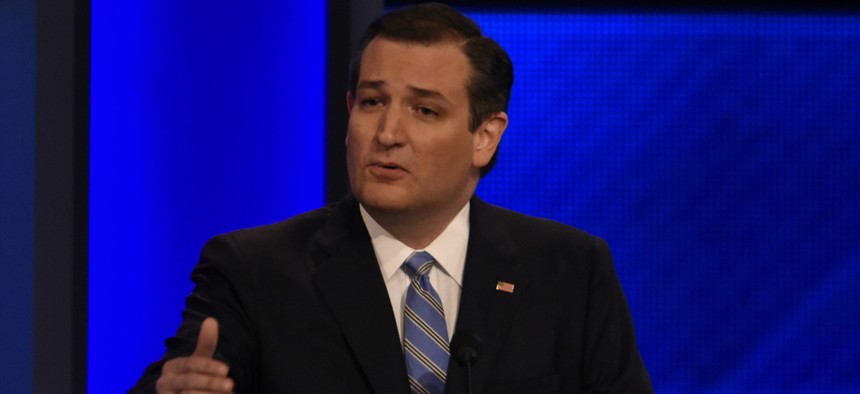
Ted Cruz at a Republican presidential debate in New Hampshire on Feb. 6. Disney/ABC Television Group via Flickr
Ted Cruz vs. ‘Plush-Bottomed Bureaucrats’
GOP presidential contender takes a shot at the military’s civilian leadership.
In a major address on the future of the U.S. military in South Carolina Tuesday, GOP presidential contender Ted Cruz laid out an expansive vision of a beefed-up force that would project power all over the world.
But Cruz, who has previously said the United States should “carpet bomb” the Islamic State into submission, also took a stand firmly in favor of military commanders, and against the civilian leadership of the Defense Department.
"Combat is death, honor and chaos," Cruz said in his speech. "The last thing any commander should need to worry about is the grades he is getting from some plush-bottomed Pentagon bureaucrat for political correctness or social experiments--or providing gluten-free MREs."
Setting aside the question of whether gluten-free MREs (that’s meals ready-to-eat, for those not familiar with the Pentagon’s lingo for food eaten in the field) are even a thing--apparently the policies on providing them differ by military service--Cruz’s comment spoke to an evident disdain for the current approach to civilian oversight of military operations.
Indeed, his official plan for growing the size of the military states: “We will scale back on the bloated bureaucracy and social experiments, and we will invest in our military with a simple goal: more tooth, less tail--that will guide every decision.”
Cruz didn’t say how much his plan would cost, although he seemed to concede that it wouldn’t be inexpensive. “To be safe tomorrow, America must invest today,” Cruz’s plan states. And he said in his speech that "if you think it’s too expensive to defend this nation, try not defending it."
Cruz, who has personal experience as a bureaucrat, is apparently of the belief that attacking “bloated bureaucracy” and ending “social experiments” will cover at least part of the cost of his buildup. And he’s not alone in thinking the Defense Department could get along with a shorter tail, especially at the Pentagon.
Still, it’s unusual for a presidential candidate, even a gung-ho supporter of the military, to attempt to drive a wedge between its uniformed and civilian leadership.
Photo: Disney/ABC Television Group, via Flickr.







